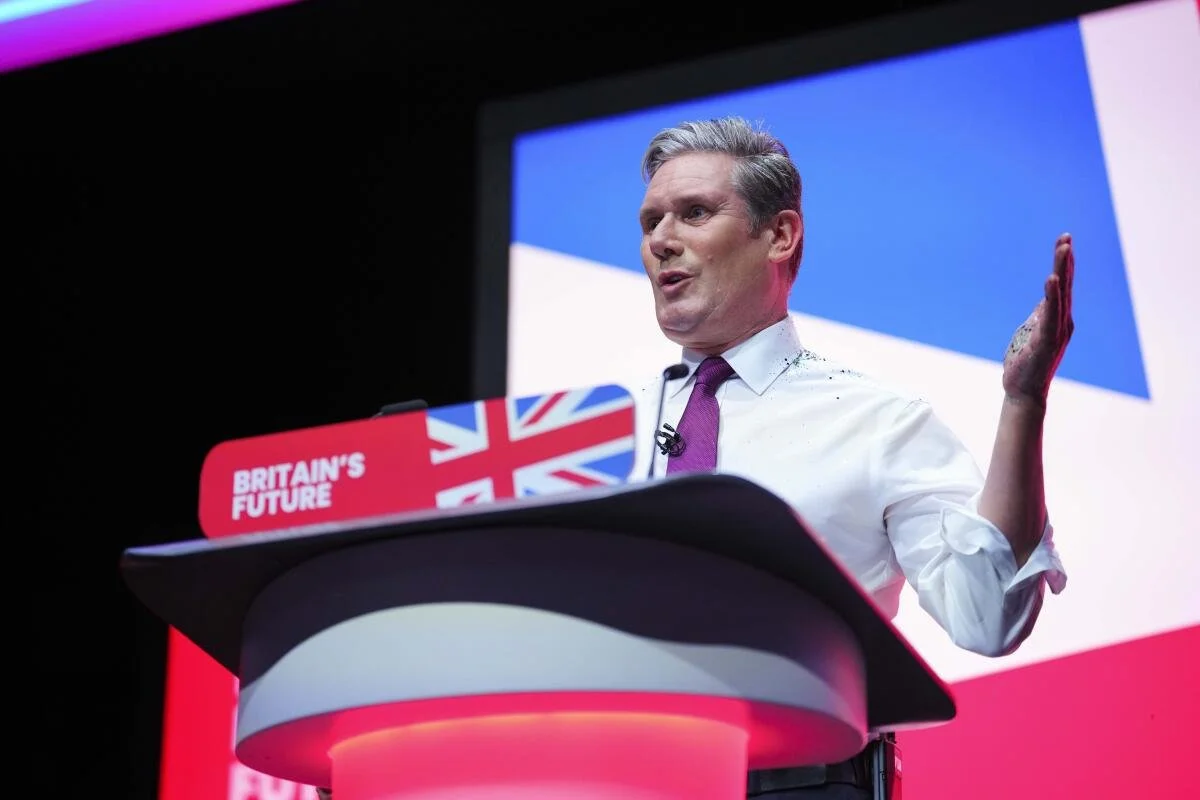
Insight
Reform conference:
Farage plans turquoise takeover
By Simon Burton OBE,
Senior Counsel
The past week has been dominated by the three Rs – reset, reshuffle, and Reform. Arguably, Nigel Farage’s insurgency has heavily influenced the first two of those. Having won the local elections back in May, holding a sustained (and quite large) lead in the opinion polls for months, and dominating the summer recess with their anti-immigration campaign, Reform UK headed into their party conference in the buoyant mood of a party making the political weather.
This mood was assisted by news breaking outside the conference bubble: the resignation of the Deputy Prime Minister and subsequent reshuffle around the Cabinet table. We are all used to seeing this under the previous Conservative administrations, but seeing this unfold within Labour so soon after the general election gave Reform the opportunity to paint them as ‘all just the same’ – whilst also causing a sense of panic from Farage, bringing his speech forward to respond to the unfolding events.

Titled The Next Step, the conference aimed to convey the feeling of one last heave to take Reform to Downing Street, but it was also perhaps a tacit admission that they still have plenty more work to do. Speakers referenced the ongoing professionalisation of the party, including investment in campaigning tools such as an app.
It was an odd gathering but also slick. There were some of the elements we are used to seeing at more established party conferences – a small exhibition area, a sponsored business lounge, merchandise for sale, and a limited fringe agenda. But the main hall was where the action was, with the outcome perhaps best described as the love child of a US political rally and a game show. Speakers entered the stage to upbeat music, we witnessed Dame Andrea Jenkyns singing while wearing a sequinned jumpsuit, and there were fireworks for the main man himself, Nigel Farage. Perhaps the most bizarre sight was TV host Jeremy Kyle with the roving mic interviewing party members on the conference floor. At times, the event felt akin to an early pantomime with booing (for mentions of Yvette Cooper or Ed Miliband) and cheers (mentions of leaving the ECHR or the phrase ‘turquoise tide’). This enthusiastic audience participation was on a different level from what we usually observe at these gatherings.
The prominence given to speakers from the Scottish Parliament and the Welsh Assembly indicated their current political priorities and the big prizes up for grabs at the elections in May, where Reform hope to further build their elected base. But the conference was light on policy details – Farage’s claim he will stop small boats from arriving in just a fortnight was lapped up in the hall, but won’t survive contact with the outside world. Putting Zia Yusuf in charge of policy development gives him a big role in shaping Reform's platform for the next election, assuming he doesn't fall out with Farage, again. The creation of a unit to help prepare for government is an effort to address one of the concerns voters hold about their lack of experience in government. It is perhaps less certain that placing Nadine Dorries in charge of it will yield the outcomes they envisage – and does little to end the underlying feeling that Reform is composed of opportunists defecting from the Conservative Party, having seen the direction of the polls.
It was a dive into that polling that proved to be a fascinating fringe event. Luke Tryl of More in Common provided an in-depth look at the numbers behind the headline voting intentions. It made grim listening for those affiliated with either of the two main parties. It seemed clear that Reform has yet to hit its ceiling in the polls, with some voters actively considering them but not yet committing, with non-voters particularly being encouraged by Farage’s offer in response to the feeling that the country and its public services are no longer working. Reform has a good presence across all age-groups as well, and their vote is far broader and deeper than anything ever achieved by UKIP – but is overwhelmingly driven by one policy area - disappointment in the levels of immigration. It is perhaps the breadth of this coalition that will provide Labour and the Tories with some hope, that as Reform flesh out their policy proposition, some voters will realise that this is not the tribe for them.
We finished the day looking round at the merchandise and were struck by how many of the water bottles, scarves, keyrings and the like, emblazoned with the Reform UK logo were actually made in China, while we couldn’t see any clear prices – leaving those queuing uncertain of the bill they would be met with. I may be reading too much into this, but I wasn’t surprised by the opaque pricing nor that the details weren’t quite as may have been assumed. Time will tell whether this is a metaphor for their wider policy offer – and we won’t have long to find out if the election falls in 2027, as Farage tells us he is preparing for.









